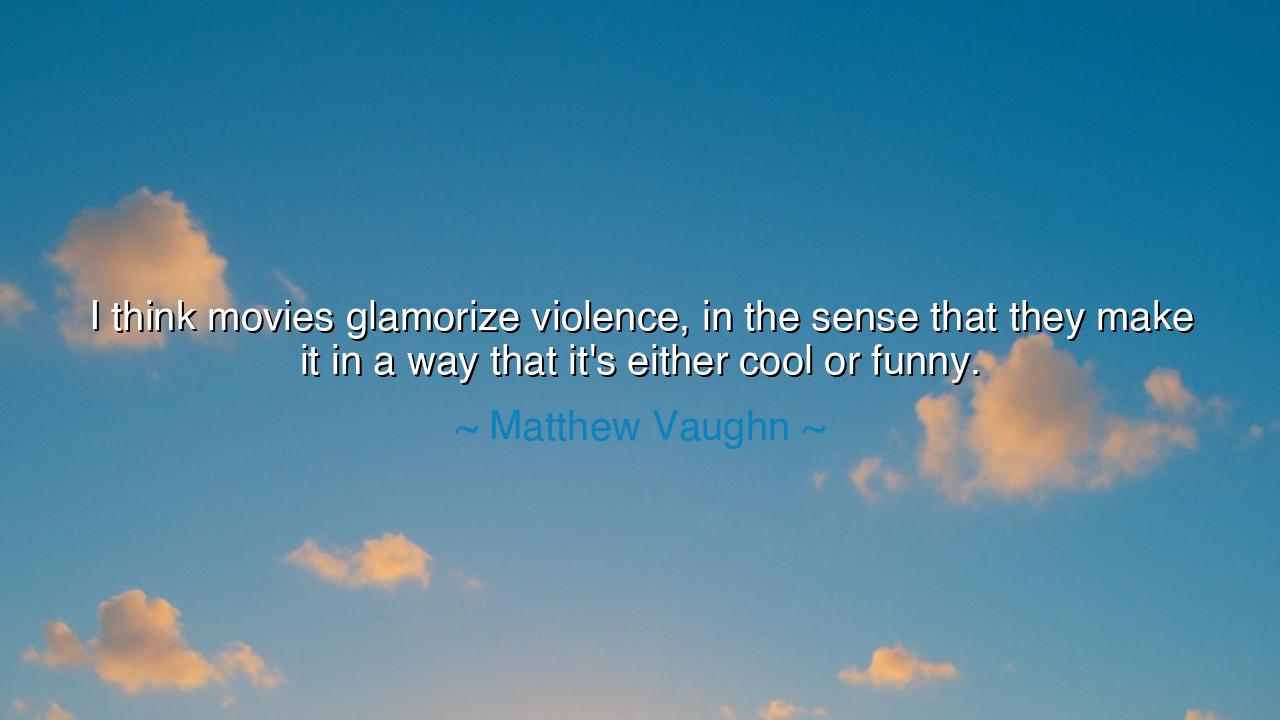
I think movies glamorize violence, in the sense that they make it
I think movies glamorize violence, in the sense that they make it in a way that it's either cool or funny.






In the world of storytelling, there lies a great power to shape the hearts and minds of those who listen. Matthew Vaughn, in his contemplation of the depiction of violence in films, brings attention to a deeply troubling aspect of modern storytelling. "I think movies glamorize violence, in the sense that they make it in a way that it's either cool or funny." These words strike at the very core of how society views and processes violence, a force that in its true nature is neither cool nor humorous, but destructive and tragic. Vaughn’s observation is not merely about films; it is a reflection on the broader cultural narrative that shapes how we perceive the world and the choices we make within it.
The ancient philosophers understood well the power of stories to influence society. Plato, in his work The Republic, warned of the dangers of storytelling that glorified the wrong values—values that led the soul away from virtue and toward corruption. He believed that the stories we tell, especially to the young, had the power to shape their character and guide their moral compass. In his time, the gods were often portrayed as wielders of violence, using it to settle scores and establish order. Plato understood that by glorifying such actions, the stories would create a generation that accepted violence as a natural part of life, not recognizing its devastating consequences. Vaughn’s reflection echoes this ancient wisdom—by portraying violence as cool or humorous, we risk desensitizing society to its true effects.
Consider the story of Achilles in the ancient Iliad, where the great warrior is both celebrated and condemned for his rage and violence. While Achilles is portrayed as a hero, the costs of his violence are evident in the death and suffering that follow him. The ancient Greeks, in their stories, acknowledged the glory of battle but also warned of the tragic consequences of unchecked anger and violence. The heroism of Achilles is tempered by the recognition that violence, while often seen as a path to glory, brings with it destruction, both of the body and the soul. The lesson here is clear: just as Plato cautioned against glorifying such tales, we must question the narratives that present violence as something to be admired or laughed at.
In the modern age, the cinematic portrayal of violence often plays with the line between entertainment and reality. From action-packed blockbusters to dark, satirical comedies, violence is often portrayed as something that can be cool, fun, or even heroic. The James Bond franchise, for example, is filled with charismatic heroes who dispatch enemies with suave precision, and yet, in the process, we overlook the real-world consequences of such actions. This is the danger Vaughn warns against—by making violence seem appealing, we create a culture that grows numb to its true impact on human lives. The heroes of these films may look invincible, but behind their cool demeanor is a destruction of innocence and the loss of humanity.
The lesson from ancient wisdom and Vaughn’s reflection is one of balance. Violence, in its rawest form, is not to be glamorized or trivialized. We must be mindful of the stories we tell and the values we promote through them. The ancients, in their wisdom, spoke not only of the glory of battle but of the costs that war and violence impose on the soul. Homer knew well that the true tragedy of war was not the victory, but the human toll it took—on the body, the mind, and the spirit. Today, we must be just as aware of the narratives we create, for they shape how future generations view violence, and whether they see it as a natural, accepted part of life, or as something to be avoided and understood for its true destructiveness.
Thus, the challenge for storytellers, filmmakers, and all who shape culture is to acknowledge the real weight of violence and to avoid presenting it as a mere spectacle for entertainment. We must honor the ancient wisdom that warns against glorifying the harmful, for such narratives shape the very fabric of society. Let us create stories that empower through kindness, wisdom, and understanding, rather than those that glorify destruction. Let us remind ourselves that true heroism lies not in the infliction of harm, but in the courage to seek peace and compassion, and in the willingness to face challenges with integrity and wisdom.
In our personal lives, too, we must recognize the danger of glamorizing violence—whether in the media we consume, the words we speak, or the actions we take. We must be cautious of how violence is portrayed, how it seeps into our perceptions, and how we unconsciously allow it to shape our decisions. Let us choose, instead, to honor those who face the challenges of life with peace and understanding, who transform conflict through dialogue and compassion. Only in doing so can we hope to build a society that values growth, healing, and harmony—not the glorification of the destructive forces that too often rule the world.






AAdministratorAdministrator
Welcome, honored guests. Please leave a comment, we will respond soon